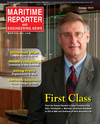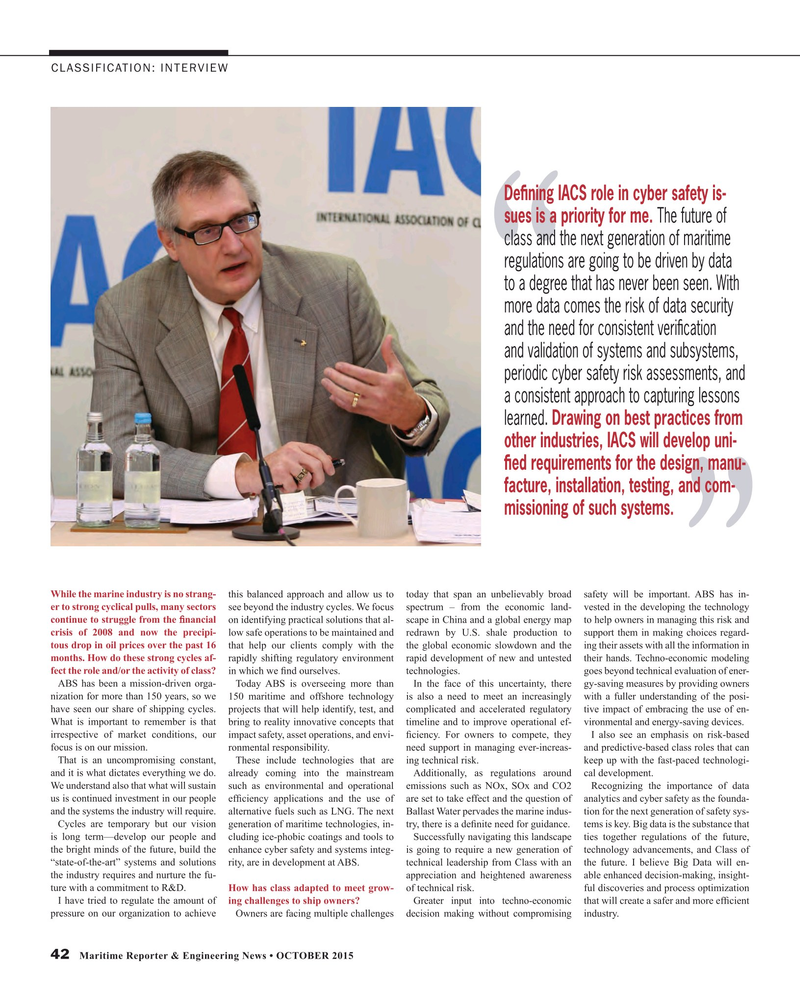
Page 42: of Maritime Reporter Magazine (October 2015)
Marine Design Annual
Read this page in Pdf, Flash or Html5 edition of October 2015 Maritime Reporter Magazine
CLASSIFICATION: INTERVIEW
De? ning IACS role in cyber safety is- sues is a priority for me. The future of class and the next generation of maritime regulations are going to be driven by data to a degree that has never been seen. With more data comes the risk of data security and the need for consistent veri? cation and validation of systems and subsystems, “ periodic cyber safety risk assessments, and a consistent approach to capturing lessons learned. Drawing on best practices from other industries, IACS will develop uni- ? ed requirements for the design, manu- facture, installation, testing, and com- missioning of such systems.
While the marine industry is no strang- this balanced approach and allow us to today that span an unbelievably broad safety will be important. ABS has in- er to strong cyclical pulls, many sectors see beyond the industry cycles. We focus spectrum – from the economic land- vested in the developing the technology continue to struggle from the ? nancial on identifying practical solutions that al- scape in China and a global energy map to help owners in managing this risk and crisis of 2008 and now the precipi- low safe operations to be maintained and redrawn by U.S. shale production to support them in making choices regard- tous drop in oil prices over the past 16 that help our clients comply with the the global economic slowdown and the ing their assets with all the information in months. How do these strong cycles af- rapidly shifting regulatory environment rapid development of new and untested their hands. Techno-economic modeling ” fect the role and/or the activity of class? in which we ? nd ourselves. technologies. goes beyond technical evaluation of ener-
ABS has been a mission-driven orga- Today ABS is overseeing more than In the face of this uncertainty, there gy-saving measures by providing owners nization for more than 150 years, so we 150 maritime and offshore technology is also a need to meet an increasingly with a fuller understanding of the posi- have seen our share of shipping cycles. projects that will help identify, test, and complicated and accelerated regulatory tive impact of embracing the use of en-
What is important to remember is that bring to reality innovative concepts that timeline and to improve operational ef- vironmental and energy-saving devices.
irrespective of market conditions, our impact safety, asset operations, and envi- ? ciency. For owners to compete, they I also see an emphasis on risk-based focus is on our mission. ronmental responsibility. need support in managing ever-increas- and predictive-based class roles that can
That is an uncompromising constant, These include technologies that are ing technical risk. keep up with the fast-paced technologi- and it is what dictates everything we do. already coming into the mainstream Additionally, as regulations around cal development.
We understand also that what will sustain such as environmental and operational emissions such as NOx, SOx and CO2 Recognizing the importance of data us is continued investment in our people ef? ciency applications and the use of are set to take effect and the question of analytics and cyber safety as the founda- and the systems the industry will require. alternative fuels such as LNG. The next Ballast Water pervades the marine indus- tion for the next generation of safety sys-
Cycles are temporary but our vision generation of maritime technologies, in- try, there is a de? nite need for guidance. tems is key. Big data is the substance that is long term—develop our people and cluding ice-phobic coatings and tools to Successfully navigating this landscape ties together regulations of the future, the bright minds of the future, build the enhance cyber safety and systems integ- is going to require a new generation of technology advancements, and Class of “state-of-the-art” systems and solutions rity, are in development at ABS. technical leadership from Class with an the future. I believe Big Data will en- the industry requires and nurture the fu- appreciation and heightened awareness able enhanced decision-making, insight- ture with a commitment to R&D. How has class adapted to meet grow- of technical risk. ful discoveries and process optimization
I have tried to regulate the amount of ing challenges to ship owners? Greater input into techno-economic that will create a safer and more ef? cient pressure on our organization to achieve Owners are facing multiple challenges decision making without compromising industry.
42 Maritime Reporter & Engineering News • OCTOBER 2015
MR #10 (42-49).indd 42 10/2/2015 1:48:55 PM

 41
41

 43
43
